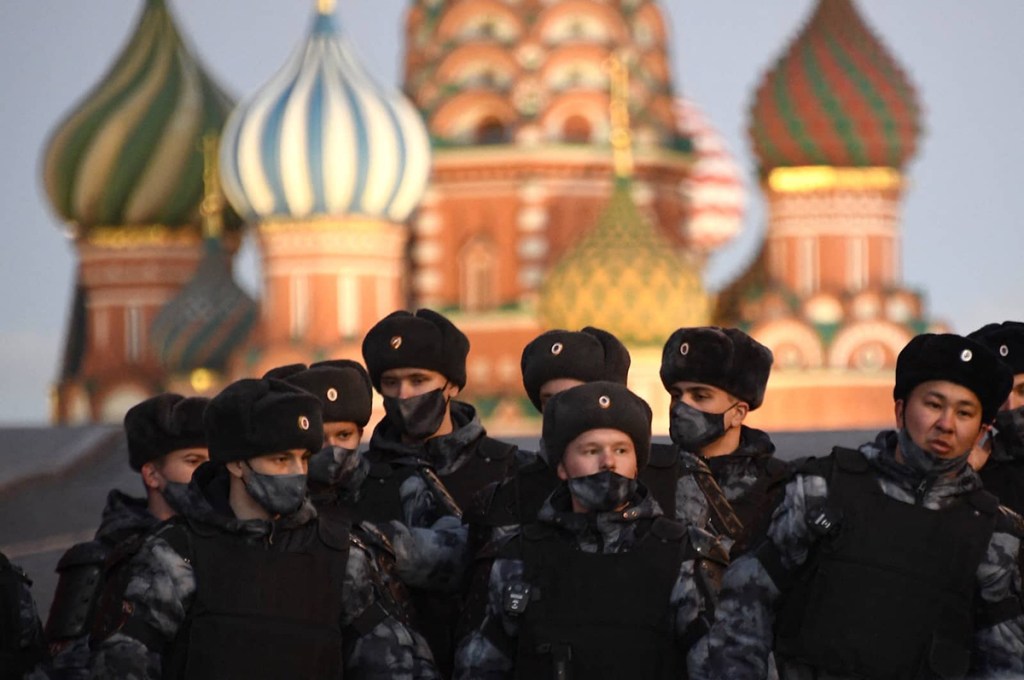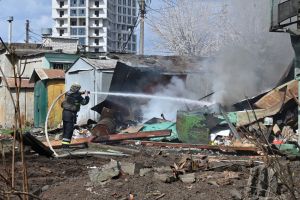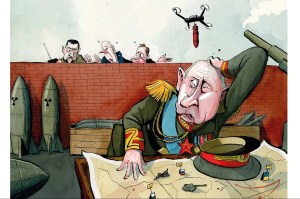Russia is now as closed off to the world as the Soviet Union was before Mikhail Gorbachev made his first tentative steps towards glasnost more than forty years ago. Pretty much all the progress that post-Soviet Russia had made towards becoming a “normal” country has been reversed within the space of two weeks. Vladimir Putin’s presumed legacy — of stability, predictability and hugely improved living standards for the vast majority of Russians — is vanishing before their eyes.
In recent days, Netflix and TikTok have joined what had already become a mass western boycott of Russia. American Express followed Mastercard in leaving the Russian market. Western supermarkets are pulling out; fashion chains such as Zara and Mango have closed, and — perhaps most emblematic of all — the Swedish household and furniture giant, Ikea, has shut the doors of its seventeen stores across Russia.
Almost all independent news has now collapsed. Access to Twitter and Facebook has been banned. International broadcasters Deutsche Welle and Radio Liberty were also blocked last week. The BBC has resuscitated its war-time and Cold War standby, short-wave radio, as the means of getting its message to Russians.
Russia’s own best-known — and most agile — independent broadcasters, the radio station Moscow Echo and the television channel TV Rain have closed in response to restrictions. These include new laws criminalizing the spread of information deemed detrimental to Russia’s armed forces and the banning of terms such as “invasion” and “war.” The editor of Novaya Gazeta announced that they too would stop their news service but would not stop collecting information:
“The Washington Post‘s first post-war publisher, Philip Graham, said news is the first draft of history. We, the first generation in Putin’s Russia, say: we cannot leave this Russian reality without at least some sketches of history.”
When they will be able to publish freely again, he does not know. Street protests against the war continue, as do the beatings and arrests. More than 4,300 people were detained on Sunday, including 1,700 in Moscow, according to Russia’s Interior Ministry. Russian rights groups say people were detained in fifty-three Russian cities, and put the tally of arrests since the invasion at more than 10,000. Where will all this lead?
As with so much about Russia today, there are several ways of assessing the significance of what is happening. Take the protests. That anyone is continuing to protest, given the near-certainty of arrest, and the geographical spread of the demonstrations are, to me, impressive. Political protests in Russia tend to be concentrated in Moscow and St Petersburg; today’s anti-war protests are taking place in towns and cities across the country, which suggests that at least some information unwelcome to the authorities is getting through. It might have been expected that all protest would have been suppressed by now; this has not happened.
Pro-Kremlin Russians, however, and even some Ukrainians argue that the number of arrests is small compared to the vastness of the country. “Stop running from the truth,” tweeted Kateryna Kruk, Ukraine manager at Facebook “that Russians who oppose Putin are in absolute minority. Majority either approves or silently ignores, or maybe disapproves but not that strong to make an action.” That view is reinforced by reports from Russians and Ukrainians with relatives in Russia who, they say, are swallowing the official version — of a limited military operation against Nazis — and are in denial about the war Russia is waging in Ukraine.
Against that, there is evidence of dissent in some elite circles. The adult children of senior officials, some celebrities and professional groups, such as doctors and architects, and a few oligarchs, whose influence goes far beyond their number as individuals. It is also possible to divine possible dissent, albeit small, in the Russian Duma.
There are similarly divergent views on the impact on the economy and ordinary people. Some observers forecast a complete meltdown of the Russian economy sooner or later, with the restrictions of Russia’s central bank and the wholesale departure of foreign companies at the core. The rouble has lost half of its value, interest rates have doubled and the stock market has been closed since Russia’s military action against Ukraine began.
Big lines have built up at cash machines in many parts of Russia. How long will younger Russians, quite unused to the exigencies of earlier times, tolerate the closing down of their world? Social media diversity, consumerism, travel have been taken away almost overnight.
Then again, Russians have lived through many crises, including financial collapse, and are more resilient than many would be in such circumstances. Putin can still press the buttons of self-reliance and the national imperative to stand up to persecution by western enemies, and — thanks to earlier sanctions especially those imposed after Russia’s annexation of Crimea in 2014 — Russia’s economy is far less reliant on imports than it was.
Until now, I have tended to argue, with many Russia-watchers, that the biggest threat to Putin is likely to come from the elite and from within the Kremlin walls, as members of his own circle register the damage the invasion has done to Russia and its national interests.
A move against Putin could be hastened if it appears the war is going badly and casualties on the Russian side mount. Reports are too unreliable at present to judge how well or badly Russia is doing — and the objectives and timetable Russia set itself are not known. The prospect of a full-scale defeat seems unlikely, given Russia’s numerical superiority, but it is hard to see how an occupation of even a devastated country could “succeed.”
It has also seemed that the popular protests, while impressive, were too small and effectively suppressed to influence anything at the top. But this could change. The vulnerability of the financial system is one reason; the fall in the rouble is likely to be followed by major inflation. Even if their Russian-issued cash and credit cards continue to work and there are no shortages of basics, how will the sudden dearth of choice be tolerated?
Putin says he has no intention of introducing martial law — contrary to rumors last week. But some of the restrictions on personal liberty could start to chafe: not just the crackdown on protest, but thoroughfares newly fenced off and patrolled in Moscow, people reportedly being stopped to have their phones examined for seditious messages and blocked news and social media. Such outlets functioned as safety-valves for dissent: what happens when they are no longer there?
And what of the jobs lost as foreign companies and their local associates close? Or when stores close, shelves empty and local businesses become unviable? There have been isolated reports — though it seems very early for the effect to have worked its way through — of protests by workers who are not being paid as a knock-on effect of sanctions. It would be alarmist and premature to note how a failing war, economic dislocation and political discontent have in the past come together to topple regimes and sow disorder, the Bolshevik revolution being a classic example. Even as the prospect must be banished as remote, it might nonetheless be worth bearing in mind.
This article was originally published on The Spectator’s UK website.


















